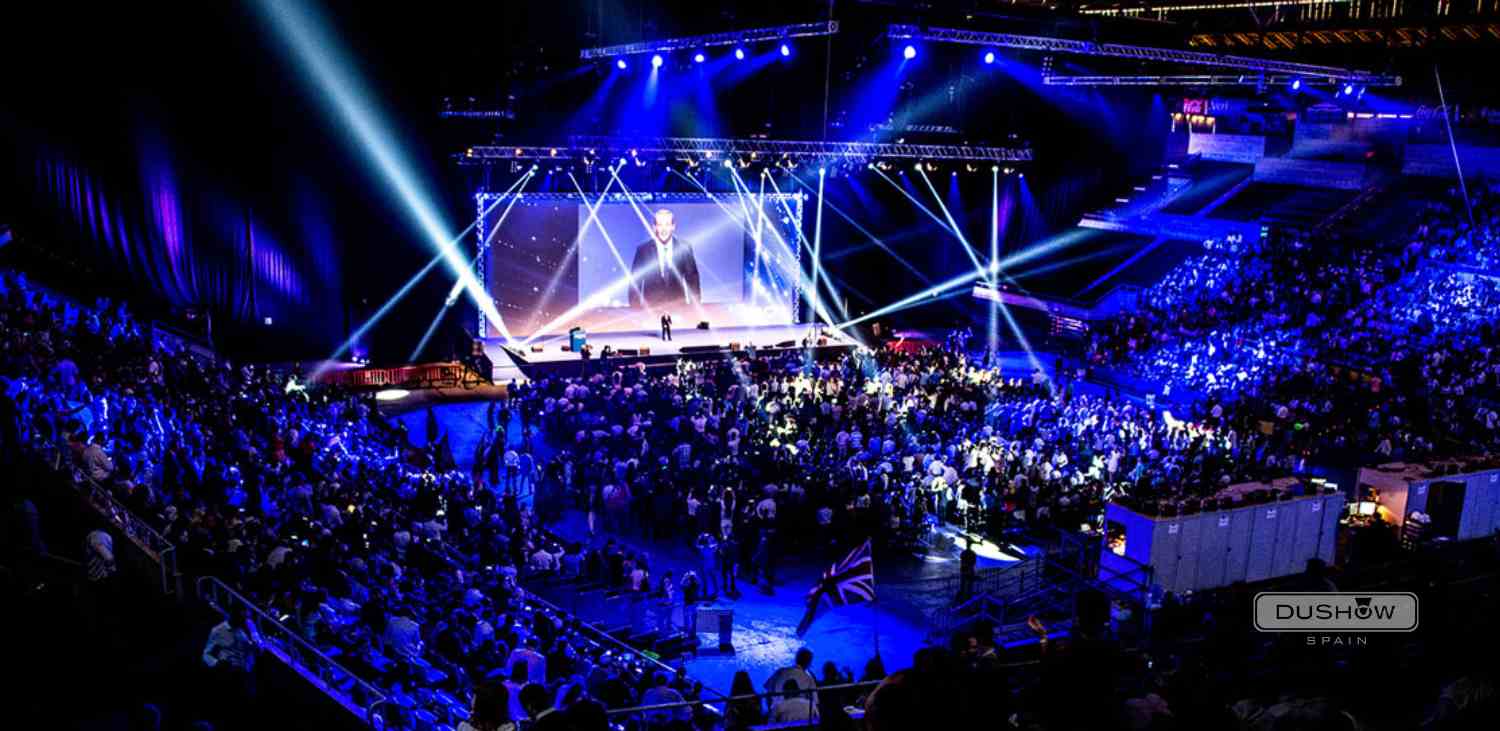Just How Event Production Functions: A Comprehensive Take A Look At the Process
Event production is a complicated and structured procedure that needs mindful planning and implementation. It starts with establishing clear purposes and understanding the target audience. Each action, from budgeting to place selection, plays an essential duty in making certain success. As the procedure unravels, various components must align perfectly. The nuances of this detailed procedure usually go unnoticed. What are the crucial stages that add to an unforgettable event?

The First Drawing Board
When starting on event production, careful planning is necessary to ensure an effective end result. The preliminary preparation stage acts as the foundation for all succeeding initiatives. During this stage, event producers should define the event's purpose and objectives plainly. Determining the target market aids customize the experience and messaging, ensuring significance and engagement.Producers should also consider the event format, whether it be in-person, virtual, or hybrid, as this will certainly influence various logistical elements. Choosing an appropriate day and location is important, as it influences access and availability.Furthermore, putting together a reliable group is fundamental for splitting responsibilities and enhancing interaction. Developing a timeline with landmarks guarantees all tasks are finished on time. This phase involves extensive research study, consisting of determining potential challenges and developing methods to alleviate threats. Inevitably, a well-structured preliminary preparation phase sets the tone for an effective event production journey.

Budgeting and Source Allotment
In event production, reliable budgeting and resource allowance are vital for success - event production charlotte. Developing financial parameters establishes the structure for all succeeding decisions, while source circulation methods guarantee that every element of the event is adequately supported. Together, these elements aid maintain control over expenditures and maximize making use of available sources
Developing Financial Parameters
Developing monetary parameters is vital to the success of any kind of event production, as it sets the foundation for efficient budgeting and source allowance. This procedure starts with defining the total spending plan, which includes all facets of the event, consisting of location prices, food catering, and marketing. By determining offered funds, event planners can prioritize expenses and assign sources appropriately. Furthermore, it is necessary to carry out thorough marketing research to expect potential expenses and identify financing sources, such as sponsorships or ticket sales. Developing clear economic specifications likewise help in threat administration, enabling organizers to allot contingency funds for unexpected expenses. Ultimately, a distinct budget plan acts as a roadmap, assisting the event production team in the direction of accomplishing their objectives while maintaining economic control.
Resource Circulation Approaches
Effective source distribution approaches are crucial for making best use of the impact of an event while sticking to budget plan restrictions. Successful event production calls for a meticulous approach to budgeting and source appropriation. Organizers have to focus on crucial elements such as venue, wedding catering, and technology, guaranteeing that funds are assigned to locations that enhance guest experience. A detailed budget should describe anticipated expenses and determine areas for possible cost financial savings, such as negotiating with suppliers or discovering sponsorship chances. In addition, tracking expenditures throughout the preparation procedure aids stop overspending. By using tactical source circulation, event manufacturers can deliver an unforgettable experience while preserving monetary duty, inevitably adding to the overall success of the event.
Location Choice and Logistics
Choosing the right venue is important to the success of any kind of event, as it sets the phase for the overall experience. Location option includes reviewing different elements, consisting of capability, availability, and place. Planners must consider the target market and the nature of the event, making certain the venue lines up with the event's goals.Logistics play a considerable function in this process, involving arrangements for seats, audiovisual equipment, and catering services. An appropriate venue must help with smooth flow for participants and team, improving engagement.Additionally, examining prospective locations for facilities like car parking, restrooms, and fire escape is essential for security and benefit. The timeline for protecting the location is additionally essential, as prominent locations may book swiftly - event production charlotte. Comprehensive planning and timely execution can inevitably contribute to a smooth event experience, making place option and logistics basic elements of effective event production.
Imaginative Idea Growth
While the location sets the physical phase, creative idea advancement forms the event's identification and story. This process starts with determining the event's objective and target audience, permitting event manufacturers to formulate an engaging motif that resonates with guests. Brainstorming sessions often consist of varied perspectives, promoting ingenious concepts that straighten with the event's goals.Once a motif is established, visual elements such as color schemes, signage, and decoration are designed to boost the general ambience. Narration methods might likewise be incorporated to create an engaging journey for individuals, assuring an unforgettable experience. In addition, considerations regarding enjoyment, activities, and interactive elements are lined up with the chosen principle, reinforcing the motif throughout the event.Ultimately, reliable imaginative idea development assurances that every element of the event works cohesively, leaving a long-term impact on participants and fulfilling the event's goals. This fundamental work lays the groundwork for subsequent planning and implementation phases.
Collaborating With Vendors and Distributors
Effective event production rests on effective cooperation with suppliers and vendors. Choosing trustworthy companions, discussing contracts efficiently, and making certain timely distributions are critical steps in this process. Each of these elements adds significantly to the total success and smooth implementation of an occasion.
Choosing Reliable Allies
Just how can event planners assure a seamless production experience? Choosing trusted companions is necessary in achieving this goal. Event organizers must conduct comprehensive study to recognize suppliers and providers with a tried and tested record of excellence. This includes examining references, evaluating portfolios, and examining have a peek here consumer comments. Organizers should focus on partners who demonstrate professionalism and trust, prompt interaction, and a desire to work together. Building solid partnerships promotes count on and enables quick problem-solving throughout the event. Additionally, it is advantageous to select neighborhood suppliers who understand the location and local logistics. Ultimately, an effective event pivots on the harmony between planners and their partners, guaranteeing next that every element of production runs smoothly and successfully.
Working Out Agreements Successfully
Effective settlement of agreements is an important action in the partnership in between event coordinators and their vendors and suppliers. This procedure involves clear interaction of assumptions, deliverables, and timelines. Coordinators must carry out extensive research study on market prices and market criteria to develop a baseline for negotiations. It is necessary to produce a collaborative ambience, encouraging open discussion regarding terms, pricing, and potential backups. Coordinators must additionally focus on recognizing the supplier's capacities and constraints to align their needs properly. Adaptability can lead to equally beneficial agreements, fostering long-term connections. Crafting distinct agreements that consist of specific performance metrics can aid guarantee liability, inevitably leading to successful event implementation and satisfaction for all parties entailed.
Making Sure Timely Deliveries
Prompt shipments are important for the smooth implementation of any kind of event, needing thorough collaboration between coordinators and their vendors and vendors. Effective communication is vital, as it helps develop clear assumptions regarding distribution timetables, quantities, and specific requirements. Coordinators commonly develop in-depth timelines to detail vital milestones, guaranteeing all parties remain aligned throughout the procedure. Routine check-ins with vendors can assist recognize prospective delays early, permitting for positive solutions. Furthermore, developing solid relationships with reliable distributors fosters trust fund and liability, which can cause better solution and prioritization. By focusing on these collaborative efforts, organizers can lessen disruptions, thus improving the overall performance of event production and making certain that all essential materials and services get here as intended.
Advertising and Promo Methods
While arranging an event, the success of advertising and marketing and promo techniques can considerably affect presence and interaction. Reliable approaches usually consist of a combination of electronic advertising and marketing, typical marketing, and grassroots outreach. Making use of social media sites platforms enables real-time interaction and targeted advertising, getting to certain demographics efficiently. Email advertising projects can better engage potential attendees with individualized web content and reminders.Collaborations with influencers or market leaders can likewise enhance reliability and widen reach. Producing engaging content, such as video clips or blogs, aids to generate buzz and sustain rate of interest leading up to the event. Additionally, leveraging early-bird price cuts and exclusive perks can incentivize ticket purchases.Promoting through typical channels, such as posters or neighborhood media, remains pertinent, particularly in community-focused events. A comprehensive method that incorporates numerous strategies guarantees maximum visibility and involvement, inevitably adding to the event's success and the development of a remarkable experience for attendees.
On-Site Execution and Monitoring
On-site implementation and management are vital parts that identify the total success of an occasion. Reliable sychronisation throughout the event ensures that all aspects straighten with the intended program. Event supervisors oversee logistics, including blog here vendor control, equipment arrangement, and guest services. Keeping track of timelines and resolving any unanticipated problems are essential for maintaining a smooth experience.The personnel plays a considerable role, as trained employees are in charge of numerous tasks such as enrollment, details circulation, and technical support. Interaction among staff member is essential; it cultivates a collaborative setting and enables fast resolution of challenges.Additionally, security protocols have to be adhered to, protecting the wellness of all participants. Post-event analyses are additionally component of on-site management, supplying understandings for future improvements. By concentrating on these aspects, event producers can produce remarkable experiences that meet or exceed participant assumptions while achieving the event's goals.
Frequently Asked Questions
Just how Do I Pick the Right Event Theme?
Selecting the best event theme includes thinking about the target market, event function, and location. Researching existing patterns and gathering input from stakeholders can additionally inspire imaginative concepts that resonate and produce a memorable experience.

What Are Usual Errors in Event Production?
Usual errors in event production often include inadequate planning, poor communication among staff member, budget mismanagement, overlooking to take right into account the audience's requirements, and stopping working to perform a detailed post-event evaluation for future enhancements.
How Can I Measure Event Success?
To measure event success, one can evaluate attendee fulfillment, engagement degrees, spending plan adherence, and post-event comments. Key performance signs, such as ticket sales and social media sites interactions, also provide valuable understandings right into total performance.
What Should I Do if It Moistens the Event Day?
In case of rain on the day, the coordinator should implement contingency strategies, such as safeguarding tents or relocating activities inside your home. Communication with guests regarding modifications is vital to guarantee a smooth experience regardless of climate challenges.
How Can I Make Sure Attendee Interaction During the Event?
